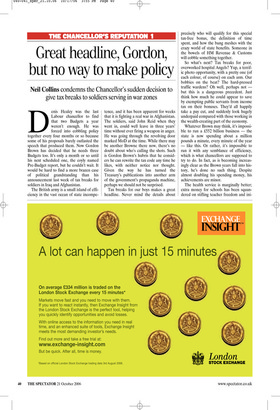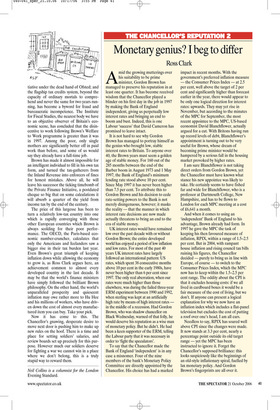Great headline, Gordon,
but no way to make policy Neil Collins condemns the Chancellor’s sudden decision to
give tax breaks to soldiers serving in war zones
Denis Healey was the last Labour chancellor to find that two Budgets a year weren’t enough. He was forced into cobbling policy together every four months or so because some of his proposals barely outlasted the speech that produced them. Now Gordon Brown has decided that he needs three Budgets too. It’s only a month or so until his next scheduled one, the coyly named Pre-Budget report, but he couldn’t wait. It would be hard to find a more brazen case of political grandstanding than his announcement last week of tax breaks for soldiers in Iraq and Afghanistan.
The British army is a small island of efficiency in the vast ocean of state incompe tence, and it has been apparent for weeks that it is fighting a real war in Afghanistan. The soldiers, said John Reid when they went in, could well leave in three years’ time without ever firing a weapon in anger. He was going through the revolving door marked MoD at the time. While there may be another Browne there now, there’s no doubt about who’s calling the shots. Such is Gordon Brown’s hubris that he considers he can rewrite the tax code any time he likes, with neither notice nor thought. Given the way he has turned the Treasury’s publications into another arm of the government’s propaganda machine, perhaps we should not be surprised.
Tax breaks for our boys makes a great headline. Never mind the details about precisely who will qualify for this special tax-free bonus, the definition of time spent, and how the bung meshes with the crazy world of state benefits. Someone in the bowels of HM Revenue & Customs will cobble something together.
So what’s next? Tax breaks for poor, overworked hospital Angels? Yup, a terrific photo opportunity, with a pretty one (of each colour, of course) on each arm. Our bobbies on the beat? The hard-pressed traffic wardens? Oh well, perhaps not but this is a dangerous precedent. Just think how much he could appear to save by exempting public servants from income tax on their bonuses. They’d all happily take a pay cut, and suddenly look hugely underpaid compared with those working in the wealth-creating part of the economy.
Whatever Brown may think, it’s impossible to run a £552 billion business — the state is now spending about a million pounds a minute, every minute of the year — like this. Or rather, it’s impossible to run it with any semblance of efficiency, which is what chancellors are supposed to try to do. In fact, as is becoming increasingly clear as the Brown years fall into history, he’s done no such thing. Despite almost doubling his spending money, his achievements are minor.
The health service is marginally better; extra money for schools has been squandered on stifling teacher freedom and ini tiative under the dead hand of Ofsted; and the flagship tax credits system, beyond the capacity of ordinary mortals to comprehend and never the same for two years running, has become a byword for fraud and bureaucratic incompetence. The Institute for Fiscal Studies, the nearest body we have to an objective observer of Britain’s economic scene, has concluded that the disincentive to work following Brown’s Welfare to Work programme is greater than it was in 1997. Among the poor, only single mothers are significantly better off in paid work than before, and some of us would say they already have a full-time job.
Brown has made it almost impossible for an intelligent individual to fill in his own tax form, and turned the tax-gatherers from the Inland Revenue into enforcers of fines for honest mistakes. Above all, he will leave his successor the ticking timebomb of the Private Finance Initiative, a postdated cheque so big that on some calculations it will absorb a quarter of the yield from income tax by the end of the century.
The price of this largesse has been to turn a relatively low-tax country into one which is rapidly converging with those other European countries which Brown is always scolding for their poor performance. The OECD, the Paris-based economic number-cruncher, calculates that only the Americans and Icelanders saw a bigger rise in their tax burden last year. Even Brown’s great triumph of keeping inflation down while allowing the economy to grow is, as Ross Clark argues here, an achievement common to almost every developed country in the last decade. It may be that the world’s finance ministers have simply followed the brilliant Brown philosophy. On the other hand, the world’s unparalleled prosperity and quiescent inflation may owe rather more to Hu Hee and his millions of workers, who have driven down the cost of almost every manufactured item you can buy. Take your pick.
Now it has come to this. The Chancellor’s gnawing, desperate desire to move next door is pushing him to make up new rules on the hoof. There is a time and place for setting soldiers’ salaries, and review boards set up precisely for this purpose. However much our soldiers deserve for fighting a war we cannot win in a place where we don’t belong, this is a truly stupid way to reward them.



































































































 Previous page
Previous page